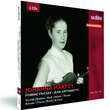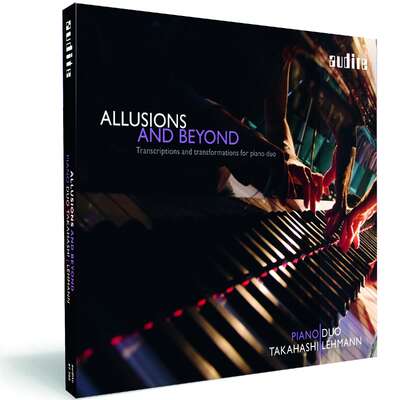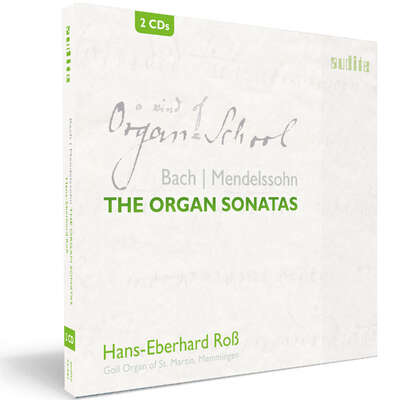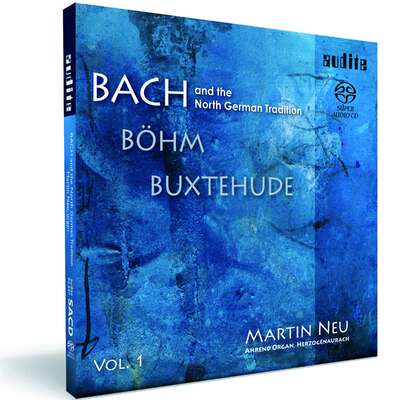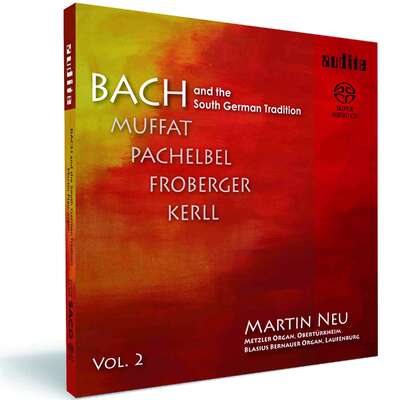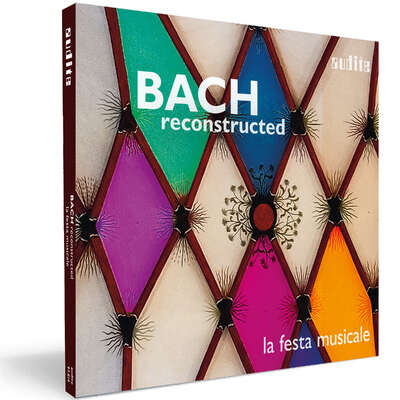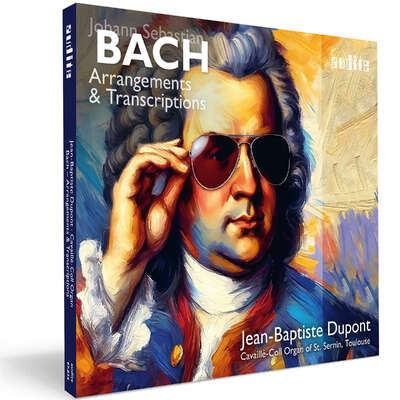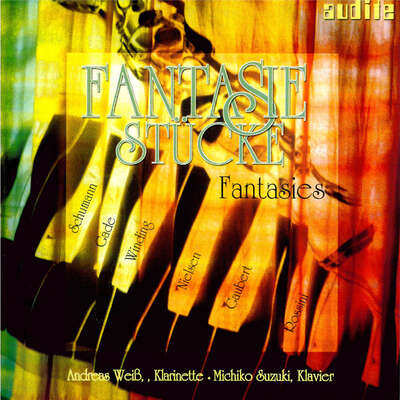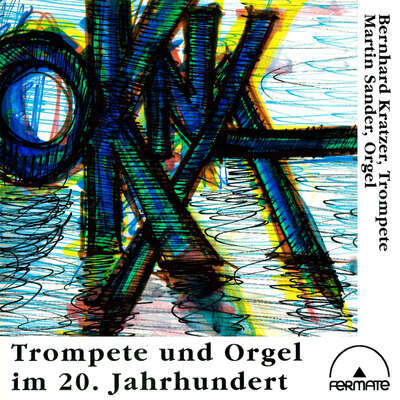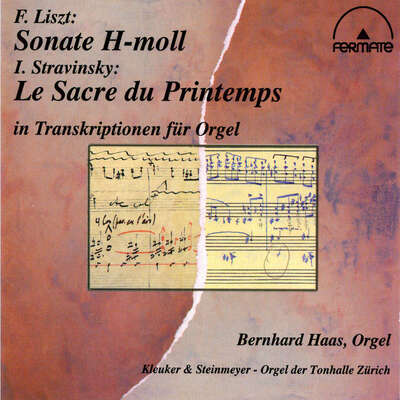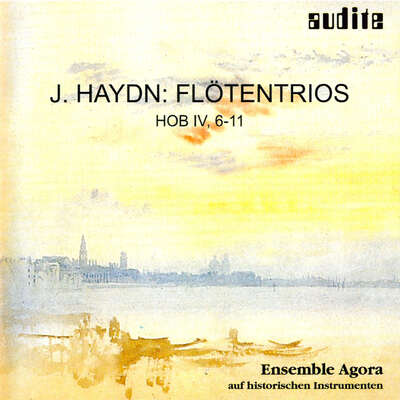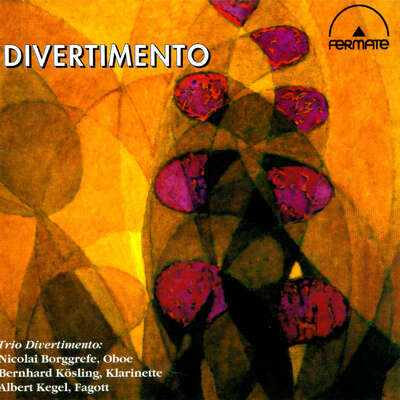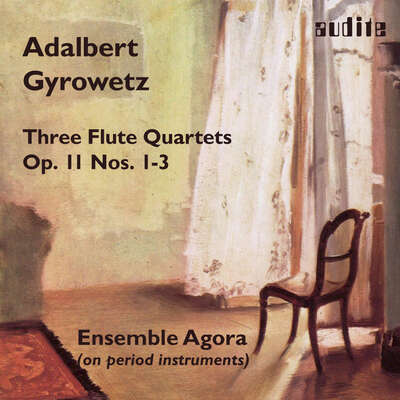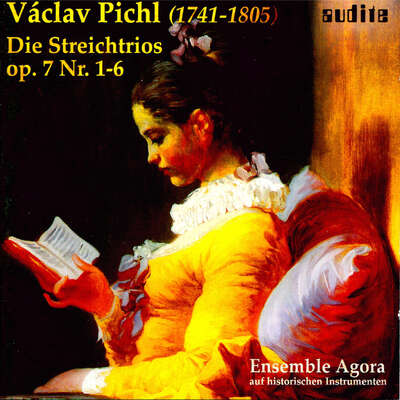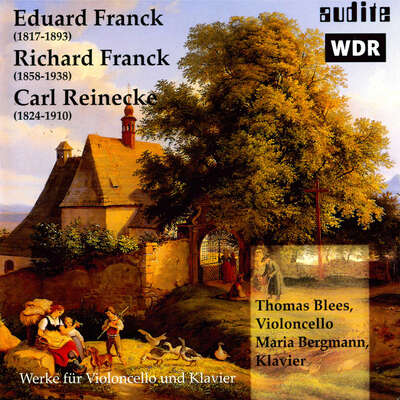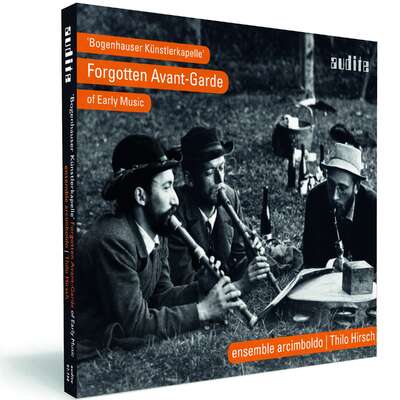
This edition impressively shows the position to which the Hungarian violinist Johanna Martzy is entitled in the history of twentieth-century violin playing, despite the brevity of her career. Her name has become a legend amongst experts, and her recordings are rare collector's items. Alongside the radio production of Dvorák's Violin Concerto, the chamber recordings prove that Johanna Martzy was still at the height of her powers at the end of her career.more
This edition impressively shows the position to which the Hungarian violinist Johanna Martzy is entitled in the history of twentieth-century violin playing, despite the brevity of her career. Her name has become a legend amongst experts, and her recordings are rare collector's items. Alongside the radio production of Dvorák's Violin Concerto, the chamber recordings prove that Johanna Martzy was still at the height of her powers at the end of her career.
Track List
Details
|
Portrait Johanna Martzy
Violin Concerto, Violin Sonatas & Violin Pieces, Berlin 1953-1966 |
|
| article number: | 23.424 |
|---|---|
| EAN barcode: | 4022143234247 |
| price group: | BCA |
| release date: | 6. February 2015 |
| total time: | 104 min. |
Bonus Material
Informationen
The Hungarian violinist Johanna Martzy was considered one of the great hopes of her generation during the 1950s. From her base in Switzerland, she conquered all the major European concert stages from 1950 onwards. Through a chain of unfortunate events, her career had already passed its apex during the early 1960s. At the end of the decade, her career that had begun so brilliantly finally came to a complete standstill. The doubts of this serious and introverted musician outweighed her longing and temptation to live a life in the limelight. Because Johanna Martzy's recording career only lasted four years, her name has become a legend amongst experts; her recordings are rare collector's items. Her highly conscious, careful selection of repertoire was completely consistent with her way of making music. The clear, brilliant tone, without any frills, of her preferred Carlo Bergonzi violin lends her playing a definite profile that is easy to recognise. She limited herself to a very manageable number of works ranging from Bach to moderate modern composers, but mastered these utterly. In 1953 she was engaged by the RIAS (today: Deutschlandradio Kultur) to participate in a production of the Violin Concerto in A minor, Op. 53 of Antonín Dvořák on the occasion of a concert with Ferenc Fricsay and the RIAS Symphony Orchestra. Since the orchestra at that time stood under the shock of impending disbandment, a recording of this same work with Deutsche Grammophon was made in order to gain financial support. Although both recordings were made in the same recording room within just a few days of each other, they are markedly different, especially in their respective sounds. The radio recording, which was long thought to have been identical to the recording made for commercial release, is being issued here for the first time. During the 1960s, when Johanna Martzy had begun to withdraw from the major concert stages for private reasons, she regularly came to Berlin to give recitals with her piano partner Jean Antonietti. On these occasions, she also visited the recording studios of the RIAS a number of times. All of the recordings made there that still exist today can be heard in this edition. Johanna Martzy's mastery and beauty of tone on these recordings are utterly convincing, and show that she was still at the height of her powers at that time. Her death in 1979, hardly noticed by the general public, thus signified a tragic loss for the musical world.
Reviews
Classica – le meilleur de la musique classique & de la hi-fi | Numéro 199 - Février 2018 | Jean-Charles Hoffelé | February 1, 2018
Quelques années avant J.-C.
Johanna Martzy
Mengelberg la dirigeant à Budapest en 1943 fut soufflé: belle filleMehr lesen
www.concertonet.com | 08/15/2015 | Sébastien Gauthier | August 15, 2015
La violoniste hongroise (née en Roumanie) Johanna Martzy (1924-1979) est quelque peu oubliée aujourd’hui: voici trois disques qui viennent à juste titre nous rappeler la grande soliste qu’elle fut, en dépit d’une carrière relativement brève qu’elle abandonna dès 1966.Mehr lesen
Record Geijutsu | 07/2015 | July 1, 2015
Japanische Rezension siehe PDF!Mehr lesen
Crescendo Magazine | Le 22 juin 2015 | Patrice Lieberman | June 22, 2015 Johanna Martzy, une redécouverte majeure
Johanna Martzy est un pur-sang au jeu noble, altier, fougueux, au son de bronze, pur et noble.Mehr lesen
The Strad | June 16, 2015 | Tully Potter | June 16, 2015 Historic recordings by a great Hungarian violinist
It is a magnificent performance of great power and intensity, especially where it is most necessary, in the Adagio. I normally find non-Czech interpretations of this concerto easy to resist but Martzy and Fricsay pay such attention to the rhythms that the result is irresistible. Even if you have the DG version, you need this one.Mehr lesen
El arte de la fuga | Sab, 13 jun, 2015 | Roberto Andrade | June 13, 2015 Johanna Martzy, una estrella del la escuela húngara de violin
Aunque nacida en Temesvar, hoy Timisoara (Rumanía), Johanna Martzy fue, en el siglo XX, unas de las representantes más notables de la escuelaMehr lesen
Su discografía para EMI, muy valiosa, ha sido recuperada parcialmente (Bach, Schubert) por Testament, y DG ha rescatado otras grabaciones suyas, pero buena parte de ellas son desconocidas para el aficionado actual. Este doble álbum AUDITE ofrece registros de muy buena calidad técnica, realizados por la RIAS de Berlín entre 1953 y 1966: obras de cámara, el Concierto de Dvorak y algunas miniaturas. Una vez más se confirma que Martzy fue una violinista de alta escuela: bello sonido, limpio, cálido y bien proyectado, técnica muy segura, ajena a alardes virtuosistas, afinación intachable y –cualidad rara hoy día- una fuerte personalidad, que dota a sus ejecuciones de un vigor interno y un carácter que las mantiene vivas para el oyente actual, con independencia de modas o maneras de época, cosa que no han logrado las de otros violinistas de entonces (un solo ejemplo: Mischa Elman). Martzy fue plenamente merecedora del decidido apoyo de Walter Legge a comienzos de los años 50; solo la posterior contratación por EMI de nombres fuera de serie como Oistraj y Kogan le retiraron a Martzy el favor de Legge, aunque también se han aducido motivos extramusicales.
Del programa ofrecido por AUDITE, los registros que más acusan el paso de los años son la Sonata de Haendel y la de Vivaldi en arreglo de Respighi, aunque la colaboración del pianista Jean Antonietti en ambas es correcta. Los resultados son mejores en la Primera Sonata de Brahms, opus 78: Martzy da una versión muy lírica, delicada y elegante, de auténtico sabor brahmsiano; con un pianista más poético, la versión hubiera sido redonda. La Primera Sonata a solo de Bach, BWV1001 en sol menor, atrae por su vigorosa realización, llena de autoridad y radiante de luz, con una fuga de nítida construcción. Por supuesto, el vibrato es intenso, pero Martzy defiende su enfoque con pleno acierto. Muy hermoso el Concierto en la menor de Dvorak: el registro monoaural que propone AUDITE es coetáneo del publicado en su día por DG. La apasionada solista muestra una profunda afinidad con la música de Dvorak y la orquesta RIAS responde admirablemente a la encendida batuta de Fricsay: una de las muy buenas versiones de esta bella obra, con un precioso tiempo lento. Por último, los cuatro bises o miniaturas bastarían para acreditar la muy elevada talla artística de Johanna Martzy: en cualquiera de ellas, y en unos pocos minutos, Martzy demuestra su excepcional calidad de sonido y su talento innato para amoldarlo al carácter de cada obra, que brilla como una pequeña joya, sea la bellísima Berceuse de Ravel, el encantador Rondino de Kreisler o la sensual Danza de La Vida Breve, transcrita por Kreisler. Un perfecto homenaje a una gran artista que merece ser recordada.
www.musicweb-international.com | June 2015 | Stephen Greenbank | June 1, 2015 Recording of the Month
The violinist Johanna Martzy isn’t that well known today. Other female violinists, like Erica Morini and Ida Haendel, whose concertizing wasMehr lesen
Romanian by birth, Martzy took up the violin at the age of six, later becoming a student at the Franz Liszt Academy, Budapest. Her teacher was Jenő Hubay (1858-1937), the Hungarian violinist and composer, whose students included Szigeti, Telmányi, Székely, Geyer and Sándor Végh. She made her début at the age of thirteen and graduated from the Academy in 1942. In 1947 she won first prize in the Geneva Competition. Starting her recording career with DG, she was later brought under the wing of EMI by Walter Legge. Her commercial recorded legacy is slender, and her international career was short-lived. In 1969 she married the wealthy Daniel Tschudi and thereafter seemed to lack the financial incentive to continue in an active role. She died of cancer in 1979, largely forgotten.
Martzy’s brief recording career began with DG, and lasted only three years. On 8 June 1953 she was scheduled to make a RIAS studio radio broadcast recording of the Dvorak Concerto with the Hungarian conductor Ferenc Fricsay. In addition, due to worries about the future of the orchestra at the time, a commercial recording was made for DG two days later (10-12 June), with the same forces and in the same venue, in order to strengthen its finances. A projected Tchaikovsky Concerto with the conductor was also on the cards for 1953, but never materialized. Like Martzy, Fricsay was not blessed with a long life, succumbing to cancer at the young age of forty-eight in 1963.
The Dvorak Concerto is the most substantial offering on this set. It is a compelling performance, technically accomplished, standing comparison with the best in the catalogue, especially that of Josef Suk/Czech Philharmonic/Neumann which heads my list of favourites. The work is an amalgam of Czech national music and folksong. In the first movement, Martzy lovingly caresses the more lyrical moments, imbuing them with a sense of longing. In the slow movement, which forms the emotional heart of the Concerto, there is fervour without over-sentimentality. The Finale is rhythmically engaging, and permeated with a Czech flavour. Everything is kept buoyant and dance-like. Comparison between the DG commercial recording and this version reveal no interpretive divergence, however the violin is more forwardly positioned and consequently more prominent in the former.
The violinist’s only solo contribution in this set is the Bach Violin Sonata No. 1 in G Minor, BWV 1001. Martzy recorded the complete Sonatas and Partitas for Columbia in 1954-55 at Abbey Road Studios in London. This radio broadcast from 4 May 1962 has had a previous incarnation on Coup d’Archet (COUP CD007). Comparing the two side by side, the Audite transfer is a slight improvement. Noticeable is some slight background distortion on the Coup d’Archet transfer. Another live performance of the Sonata from the Redpath Hall Montreal dated 1960 on the Doremi label (DHR-7753) is in less than ideal sound. I have always enjoyed Martzy’s solo Bach for the beauty of tone, spotless intonation and richness of colour she draws from her Carlo Bergonzi fiddle. Especially distinctive is the precision of the counterpoint and clarity of articulation she brings to the fugue.
It was when performing at the Dutch Radio Station VARA that Martzy met Jean Antonietti (1915-1994), the director of music there. He is the pianist in the remaining works, and became a regular partner. Though starting off as a soloist, Antonietti’s career eventually became concentrated in accompanying, working with Elisabeth Schwarzkopf and the cellist Tibor de Machula. Martzy and Antonietti appeared for the first time together in February 1949 in Amsterdam.
The Brahms and Handel Sonatas were set down at the same session as the Bach, in the RIAS Funkhaus – Studio 7. The Brahms Sonata is marked by warmth and elegance and the outer movements never sag. It’s a lyrical work, and the players are expressive in the account they deliver. Beauty of tone is a distinctive hallmark of the Handel Sonata. It is a performance of refinement and nobility, with both players demonstrating a great affection for the music.
The Vivaldi Sonata has, surprisingly, been arranged by Respighi, and is a piece new to me. Nevertheless, it is a tastefully performed delight. The remaining four small encore pieces from April 1955 have already seen the light of day on Coup d’Archet (COUP CD006). The Beethoven/Kreisler Rondino is loaded with Viennese charm, without sounding in any way schmaltzy. The de Falla Danse Espagnole was recorded commercially for DG by Martzy and Antonietti in 1951. Again it is a Kreisler arrangement, dispatched brilliantly with suavity and elan.
This is a smartly presented, elegant gatefold digipak. Excellent, informative booklet notes by Rüdiger Albrecht, in German and English, provide a biographical portrait of the violinist and discuss the context and provenance of the recordings. Audite have done a wonderful job re-mastering these original analogue tapes from the RIAS archives, and sound quality throughout is top-notch. Though not stated, all the recordings are in mono.
Preis der Deutschen Schallplattenkritik | 13. Mai 2015 | Wilhelm Sinkovicz | May 13, 2015
Die ungarische Geigerin Johanna Martzy wurde trotz ihrer kurzen Karriere zu einer Interpreten-Legende. Diese Edition versammelt BerlinerMehr lesen
www.artalinna.com | 10 mai 2015 | Jean-Charles Hoffelé | May 10, 2015 Archet de feu
Mais le sommet reste la Première Sonate de Bach dont les polyphonies s’incarnent par un jeu sur les registres sciant – les basses rugissent, les aigus flutent, ce n’est plus un violon, c’est un orgue !Mehr lesen
Der neue Merker
| Mai 2015 | Dr. Ingobert Waltenberger | May 1, 2015
AUDITE: Hommage an die legendäre ungarische Geigerin Johanna Martzy auf 2 CDs
Deutschlandradio Kultur gibt die RIAS Bänder 1953 bis 1966 frei
Bei nachtwandlerisch sicherer Intonation zaubert die ungarische Virtuosin einen runden stets sinnlich-sängerischen Klang aus ihrer Carlo Bergonzi Violine. Der edel fokussierte Ton schimmert wie ein roter knackiger Apfel im Abendlicht. Und Martzy verzichtet dabei nicht auf den Hochseilakt der eigenen spontanen Lesart und des Risikos der unbedingten Hingabe an den Augenblick. [...] Das ausführliche Booklet erinnert in einem exzellenten Essay von Rüdiger Albrecht ausführlich an die nunmehr ein Stückchen mehr dem Vergessen entrissene ungarische Künstlerin.Mehr lesen
Märkische Oderzeitung | 02.04.2015 | Peter Philipps | April 2, 2015 Johanna wer? - Klangtüftler von audite graben Schätze aus
Das Violinkonzert von Dvorak sowie die Violinsonaten von Bach (g-moll) und Händel (A-Dur) klingen frisch und mit einer sehr unsentimentalen Wärme. Ravels „Berceuse sur le nom de Gabriel Fauré“ rundet den musikalischen Leckerbissen wie ein vorzügliches Dessert ab Mehr lesen
Audiophile Audition | April 1, 2015 | Gary Lemco | April 1, 2015
Any devotee of great violin playing and kindred instrumental partnerships will treasure this Martzy set with unbounded affection.Mehr lesen
Gramophone | April 2015 | April 1, 2015
At first glance the principal attraction in a two-disc set devoted to the art of violinist Johanna Martzy (1924-79) appears to duplicate a recordingMehr lesen
The remainder of Audite's set emanates from the 1960s. Dvorak's Concerto is tailed by a vibrant account of Brahms's First Sonata, and Martzy's sound is darker than in the orchestral work, with an Oistrakh-like radiance about it, especially in the first movement. The second CD opens with solo Bach, the G minor Sonata, and a reading that's notable for its rigour and the rhythmic security of the second movement fugue. Sonatas with piano by Handel (Op 1 No 3) and Vivaldi (RV10, arranged by Respighi), like the Bach, take us back to a period prior to the onset of 'original instruments' and sound as refreshing now as the 'authentic' performances sounded then. Martzy was a very musical player and charms in various shorter works (the pianist is Jean Antonietti).
Diapason | N° 634 Avril 2015 | Nicolas Derny | April 1, 2015
En 1953, Johanna Martzy entrait dans la cour des grands grâce à un concerto de Dvorak enregistré avec Ferenc Fricsay (DG). Quid de celui-ci, captéMehr lesen
Autre cheval de bataille de la Hongroise : la musique pour violon seul de Bach, dont elle signa au milieu des années 1950 une intégrale incontournable. Immortalisée le 4 mai 1962 (témoignage déjà édité par le label Coup d'Archet), la BWV 1001 passionne tout autant. Chair généreuse (quelles basses !), vibrato marqué, ligne mélodique soutenue sans répit, sa patte rigoureuse se reconnaît de loin. Abordées dans le même esprit, les Sonates op. 1 n° 3 de Handel et RV 10 de Vivaldi/Respighi sont hors d'âge, et cela fait tout leur charme. Auquel on succombe, jusque dans la moindre inflexion mélodique (chez le Saxon surtout).
Le talon d'Achille de Martzy ? Jean Antonietti, « accompagnateur » fidèle et prosaïque. Difficile, voire impossible, avec un partenaire aussi limité, d'établir le dialogue attendu dans l'Opus 78 de Brahms. La violoniste, qui porte la culotte et se consume de l'intérieur, est aussi coupable en vérité. Pour que le miracle opère, il faut qu'un duo se parle. On préfère se souvenir de lui par ses inestimables Schubert (Diapason d'or, Testament). Ou céder à la Danse espagnole de Falla, la plus délicieuse des miniatures offertes en complément.
www.classical.net | 01.04.2015 | Brian Wigman | April 1, 2015
she's [Martzy] excellently supported by the radio orchestra and sings sweetly throughout.Mehr lesen
BBC Radio 3 | 07.03.2015 | March 7, 2015 BROADCAST
Sendebeleg siehe PDF!Mehr lesen
BBC Music Magazine | March 2015 | Julian Haylock | March 1, 2015
Another invaluable collection of Martzy recordings, including a glorious account of the Dvorak Violin Concerto recorded for Berlin radio in 1953, twoMehr lesen
Kulturspiegel | März 2015 | sal | March 1, 2015 Neue Klassik-Alben
Mit der akustischen Ehrenrettung dieser großen ungarischen Geigerin ist Remastering-Experte Ludger Böckenhoff wieder mal eine kleine Großtat gelungenMehr lesen
